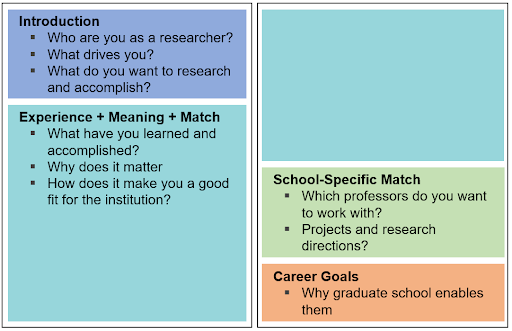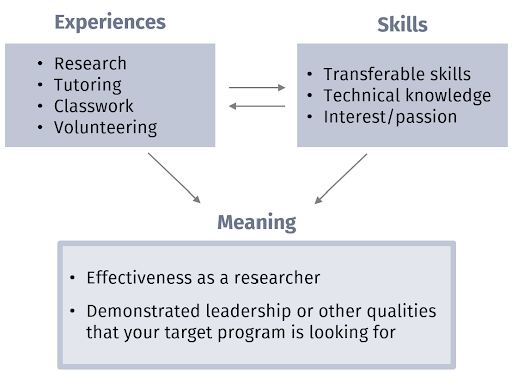

The graduate school Personal Statement (≈ Statement of Purpose ≈ Statement of Intent) is a document that complements your resume and application form, describing your profile in a narrative way and convincing the admission committee that you would be a good match for a particular department or program. Take into account that matching goes both ways: they should be interested in you, and you should be interested in them. Your personal statement should make this match clear.
Your personal statement will be read by a graduate committee – a handful of faculty from the program. They’re trying to determine if you will be a successful graduate student in their department and a successful scientist after you graduate. They are interested in your qualifications as a researcher, your career goals, and how your personality matches their labs and department.
The graduate committee probably reads hundreds of applications every year. To make it easy for them to figure out that you are a good fit, keep in mind the following suggestions:
A key point on writing your Personal Statement is to demonstrate that you have done previous research about the program to which you’re applying, that you understand its characteristics and objectives, and that you are really interested in joining it and willing to do your best to be successful in it. To do this:
To convince a graduate committee that you are ready for and excited about graduate school, first you need to be able to articulate this to yourself. Earnestly reflect on the following types of questions. A lack of authenticity is easy to detect.
Graduate programs invest in the professional and scientific growth of their students. Get the committee excited about investing in you by opening your essay with a brief portrait of what drives you as a scientist. What research directions are you passionate about, and why? What do you picture yourself doing in 10 years?
Close your essay with a 2-3 sentence discussion of your long-term career interests. No one will hold you to this; this just helps your committee visualize your potential trajectory.
Connect your personal narrative to whichever degree you are applying to (be it research-based or course-work-based, or a Master of Science, Master of Engineering, or PhD). Especially in mechanical engineering, each of these degrees will enable different career trajectories and provide different educational opportunities. Articulate clearly why the degree you are applying for helps you achieve your goals. In the same vein, consider mutual benefit: what will you contribute to the academic community over your time at your target school? Remember, it all comes back to “qualified match” , no matter what level of degree you are applying for.
Experiences are the “what” of your essay. They are the most efficient and easiest way to prove your capabilities to the admissions committee.
Achievements need not be limited to research projects or publications. Think about all the experiences that demonstrate your ability to conduct research and succeed within the structure of your target program. (Where have you demonstrated creativity? Self sufficiency? Perseverance? What open ended problems have you tackled? What enabled you to succeed at them?)
Quantify your experiences to show concrete impact. How many people were on your team? How many protocols did you develop? How many people were in competition for an award? As a TA, how often did you meet with your students?
| Vague experience | Concrete experience |
| As a senior, I received an A in a graduate-level Structure Mechanics course. | My interest in structural analysis led me to take advanced coursework to learn more about steel structures. At the graduate-level Structural Mechanics course, I learned about joints design which boosted my interest in… |
| During my third year, I worked on a project for my Hydrology class that made me get interested in numerical modelling. | During my third year, I had the chance to conduct a research-oriented class project about the hydrology of the Mississippi river and the impact of global warming in its regime. In this project, I ran a hydrological numerical model using the open source software … While working on this project, I was faced with the difficulty of getting updated topographic data of the study area. I managed to overcome this issue by… |
| I volunteered for the Campus Preview Weekend for the last three years. At this position, I demonstrated my leadership and management skills. | Committed to being a great ambassador of our residence hall, I volunteered for the Campus Preview Weekend for the last three years, scheduling events within our dorm, then welcoming the prospective students as they arrived and directing them and their parents around campus to the activities we had planned. This experience allowed me to gain training on dealing with time constraints and a large group of people. Last year, for example…. |
For each experience you include, focus on how the experience affected you. Describe your actions, and always direct the message to highlighting your performance and growth (not how important the company was or how well-known the professor you TAed for is). Remember, it is not an essay about science, it is a personal essay—about you and how you have positioned yourself to succeed in graduate school.

Your goal in sharing your experiences is to demonstrate that you have the qualifications, qualities, and drive needed to succeed in graduate school. Therefore, you will need to not only choose experiences wisely but also state specifically what they mean within the context of your application.
Even if it feels obvious to you, you need to explicitly answer these questions to your audience. Here are some examples experiences that have been expanded to contain meaning:
Contemplate how disparate activities can be unified into a common narrative about your motivations and achievements. Articulate this clearly to make your statement cohesive.

Using the research you did to assess your chosen programs, clearly articulate why you are a match . Consider both directions of the match: not only why you want to go to the school, but also why you would fit in well and contribute to the program.
State which professors in the program you would be interested in working with. Demonstrate that you have done your homework regarding the program. Show how their research areas align with your background and your goals. If you have had conversations with students or professors in the program, be sure to include that as well.
Write about you, not your role models. One of the most common pitfalls we see in the Comm Lab is students writing touching Personal Statements about family members or role models who have inspired them. There is nothing wrong with including personal stories about people who have helped you understand yourself better, or positioned you to succeed in graduate school, but it is important to tread very carefully. Don’t leave the reader wondering why they are reading about someone else in a document that is meant to be about you. If you take time to talk about someone who positively affected you, make sure to be very clear about how that experience with that person molded you into a strong graduate school candidate.
Be judicious with childhood stories. A brief mention of some childhood experience that shaped your interests in STEM is probably okay, but if you talk about it at length (more than ~2 sentences), you are taking up space that should probably be used to talk about who you are today, not who you were over a decade ago.
Don’t simply restate your resume. Your Personal Statement should be a technical document (having evidence, numbers, and supporting facts) with personal outcomes (talking about your motivations, ambitions, and ability to succeed as a graduate student). Of course, you will reiterate parts of your resume in your Personal Statement , but what uniquely makes it a “Personal Statement” is the discussion of how those professional experiences affected you , as a researcher and person well-suited to the graduate program at X University.
Insufficient quantification of your experiences. We are all scientists and engineers; our line of work is inherently quantitative. Quantification is a quick and easy way to add context, lend credence to your experiences, and impress the reader. Even little quantifications can help: “I spent two semesters working on a project about…” is much better than “I spent some time working on a project about…”. See more examples in the section on Experiences, above.
Being a great student and having an impressive resume is only half the battle when it comes to graduate school applications. You need to be able to communicate and convince the committee that your personality and particular set of skills and experiences are well-suited to the graduate program you are applying for. This extends beyond graduate school applications: as scientists and engineers, we write papers and technical reports to communicate with our peers and convince them that our work is meaningful.
By reading this article, you have recognized the value of communication and are well on your way to crafting an effective and powerful Personal Statement. This is your opportunity to make yourself shine among all the other candidates, so make it count! You can do it!
Acknowledgements : This content was adapted from the NSE and CEE Communication Labs’ CommKits for graduate applications.